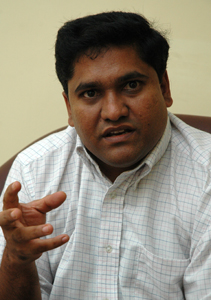Citing that 256 NGOs in the country had spent Rs 40.1 billion they had received for tsunami relief work from 2004 to 2006 in a non-transparent or questionable manner, a Parliamentary Select Committee in an interim report has called for tough regulations to check NGOs.
One of the NGOs that came under heavy scrutiny by the committee on NGOs was the Tamil Rehabilitation Organisation (TRO). According to the report, the committee, headed by JVP’s parliamentary group leader Vijitha Herath, found that the TRO, alleged to be an LTTE-front organisation, had received US$ 10 million by 2006 from the United States alone for post-tsunami work. The total amount of aid received by the TRO in the two years since the tsunami was around Rs. 2.2 billion.
 |
| Vijitha Herath |
The report, which was presented to Parliament last week by Mr. Herath, said the tsunami disaster, opened the floodgates for International NGOs but most NGOs operated in contravention of the laws and policies of the state while there was little transparency in the auditing of the funds. The report also noted that level of interference by the INGOs in the internal affairs of the country had increased in the two years since the tsunami.
The report said one of the main aims of the committee was to ascertain whether NGOs or INGOs which claimed they were committed to resolving the North-East conflict and ushering in peace had acted in a manner that posed threats to the territorial integrity and national security.
The report also noted that with the escalation of the conflict in the north and the east, several foreign-funded NGOs had entered the country with objectives such as conflict study, conflict resolution, coexistence, national unity, devolution of power, introducing federalism, attitudinal change, human rights, humanitarian development and de-mining activities.
The report said the committee probed the activities of several NGOs, including the National Peace Council, the Community Trust Fund, the Japan Centre for Conflict Prevention, the Consortium of Humanitarian Agencies (CHA), the Inter-religious Peace Foundation, the National Christian Council, the Human Development Centre-Jaffna, the Sarvodaya Movement for International Justice and Equity, the Law and Society Trust, the Kolpin Society, the Foundation for Co-existence and the Burghof Foundation for Conflict Studies.
The report said the committee found that some NGOs had gradually stepped into the sphere of state policy-making. They had published a large number of books, publications, articles in local and foreign newspapers and journals, the report said adding that most of these documents, which were in English, seemed to have been published with the primary aim of receiving foreign aid.
The report charged that most of the NGOs, especially those that were active in conflict resolution and peace building areas, had embarked on a campaign to change the people’s perception of the public sector institutions by projecting state agencies as inefficient.
“The influence made on the policies of the government by the Burghof Foundation which was invited to the island to resolve the conflict in Sri Lanka stands testimony to prove the above fact,” the report said.
The NGOs focusing on humanitarian services and rehabilitation and welfare include FORUT, SCF, OXFAM, Euker Peace Do Services, Care International, Sarvodaya, Friends’ Foundation, Stromme Memorial Foundation, Save the Children, Redd Barna, World Vision, Medicin Sans Frontiers, TRO and ZOA.
The report said the inspection of the accounts of these NGOs showed they had received massive donations from their mother organisations and other relief groups. Of these organisations, World Vision, Save the Children, the TRO and Sarvodaya had received colossal amounts as tsunami aid.
The committee also said NGOs engaged in de-mining work also had received colossal amounts from foreign sources with the European Union and ten countries providing Rs 1,905 million in 2005 and Rs 2,200 million in 2006. The committee said it found there were records for de-mining activities in government controlled areas, but there were no such records for work done in the rebel-controlled areas.
The committee proposed that all NGOs be regularized to enhance their transparency and accountability and a proper legal framework be drawn up to deal with these organisations. To achieve this objective, it called for the repeal of the Social Services Organizations Registration and Supervision Act No. 31 of 1980 and the enactment of a new act incorporating provisions to regularize NGOS.
Under new legislation, a high powered commission should be set up to define what constitutes an NGO and a method of compulsorily registration be introduced, the committee said.
The Committee also proposed that under new legislation errant NGOs should be banned and their foreign heads should be repatriated.
To provide more opportunities for Sri Lankans to work in NGOs, the number of foreigners serving in NGOs should be limited and confined to essential expert posts.
It was also proposed that the accounts of NGOs which are operative in Sri Lanka should be maintained in state-approved banks and their accounts should be maintained in conformity to the auditing standards of Sri Lanka.
The Committee called for measures to decentralize the powers of the high-powered commission to district and divisional operation committees. It was found that while most foreign-funded NGOs entered the country after the onset of the separatist war, nearly 50% of NGOs are housed in Colombo. Some 8% have offices in the North Central Province, 5% in the Central Province, 3 % in the Southern Province around 20 % in the Northern and Eastern provinces. | 
